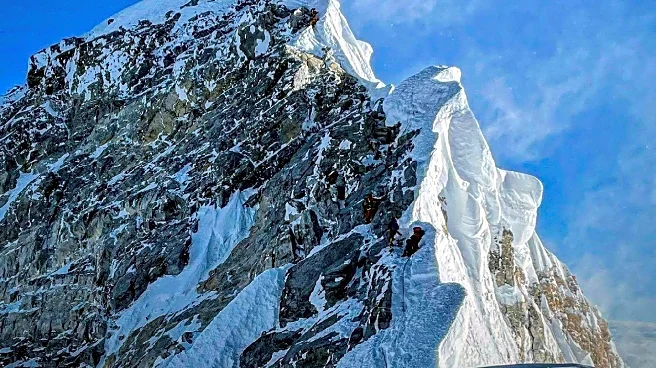What's Happening?
Melissa Arnot Reid's memoir, 'Enough: Climbing Toward a True Self on Mount Everest,' offers a candid exploration of her life, detailing her personal struggles and achievements in mountaineering. The book
delves into Reid's challenging childhood, marked by familial discord and a traumatic experience with a policeman, leading to her placement in foster care. As she grows older, Reid becomes a mountain guide, achieving significant milestones such as summiting Mount Everest without supplemental oxygen. Her narrative intertwines personal introspection with accounts of her mountaineering experiences, including her role in defusing a conflict at Camp Two on Everest. Reid's story is one of resilience, as she navigates failed relationships, personal loss, and the demanding lifestyle of a high-altitude guide.
Why It's Important?
Reid's memoir is significant as it highlights the intersection of personal growth and professional achievement, particularly in the male-dominated field of mountaineering. Her story underscores the challenges faced by women in extreme sports and the broader implications of overcoming personal trauma to achieve professional success. Reid's experiences on Everest, including her involvement in the 2013 Camp Two conflict, offer insights into the complexities of international climbing expeditions and the cultural dynamics at play. Her narrative also sheds light on the emotional and physical demands of high-altitude climbing, contributing to the discourse on mental health and resilience in extreme environments.
What's Next?
Reid continues to contribute to the mountaineering community through her work with the Juniper Fund, a non-profit she co-founded to support families of high-altitude workers who have died in the mountains. Her ongoing involvement in this initiative reflects her commitment to addressing the socio-economic challenges faced by Sherpas and other mountain workers. As Reid's memoir gains attention, it may inspire further discussions on the role of women in mountaineering and the importance of mental health support for climbers. Her story could also encourage more climbers to pursue oxygenless ascents, pushing the boundaries of human endurance and capability.
Beyond the Headlines
Reid's memoir offers a deeper understanding of the ethical and cultural dimensions of mountaineering, particularly in relation to the Sherpa community. Her experiences highlight the need for greater recognition and support for the contributions of local guides and workers in the climbing industry. The book also prompts reflection on the personal sacrifices and emotional toll associated with pursuing extreme sports, raising questions about the balance between ambition and well-being. Reid's narrative may influence future discussions on the ethical responsibilities of climbers and expedition leaders in ensuring the safety and fair treatment of all participants.









